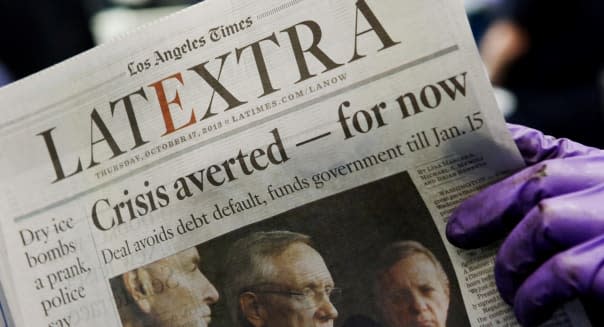Survey: As Shutdown Memories Fade, Financial Optimism Grows

Last October's 16-day government shutdown affected the lives of millions of Americans as federal offices closed, paychecks and federal assistance were put on hold, and popular tourists spots were shuttered.
But Americans have shaken off much of the doom and gloom they felt during the shutdown, results of the new Financial Optimism Index released Tuesday show.
The survey, produced jointly by Consumer Bankers Association and AOL (AOL) -- publisher of DailyFinance -- shows that Americans are significantly less concerned about their personal finances than they were when the shutdown ended Oct. 16.
The monthly survey of consumer attitudes noted these findings:
In October, Americans' level of financial optimism was low, with the index at -24, indicating that pessimistic views outnumbered optimistic ones by 24 percentage points. The news about the government shutdown was negative, and Americans were worried about how the political and economic situation would affect their personal finances.
In November, the index increased by 16 points to -8. News became more positive, and Americans grew less worried about how the big picture issues would affect their personal finances.
December: The index remained flat at -8.
In January, the index increased again to +4 -- the first time the newly created index was positive. The increase was driven by Americans seeing more upbeat news about personal finances. The results could also reflect the impact of rising stock prices and a declining unemployment rate.
February: The index fell to -2.6, a drop of 6.6, mainly driven by a perception that news about Americans' personal finances wasn't as positive. Possible factors include the slow start to the month in the stock market and rising prices for gasoline.
The Finance Optimism Index tracks optimism through agreement with four statements in a survey:
I am optimistic about my personal financial future.
I am worried about my current financial situation.
The news I've been hearing in the past few weeks about Americans' personal finances has been generally positive.
I am worried that the current economic and political situation is going to affect my personal finances.
(The index is calculated using the percentage of optimistic responses given by U.S. adults minus the percentage of those who are pessimistic. A value above zero indicates more respondents felt optimistic, while a negative number means more felt pessimistic. About 1,600 adults are polled each month.)
%VIRTUAL-article-sponsoredlinks%Together with the CBA, AOL has been conducting research over the past year to better understand consumers; attitudes about their finances, the companies said.
"This new project with AOL represents an opportunity to understand the current personal finance attitudes of American consumers," Richard Hunt, president and CEO of CBA, said in a statement. "No other index is providing this unique information which will help our members and the retail banking industry anticipate consumer needs and concerns."
The companies said they will follow Americans' level of financial optimism over time, delving into what influences the ups and downs of this attitude, including economic and political events and the news cycle.

